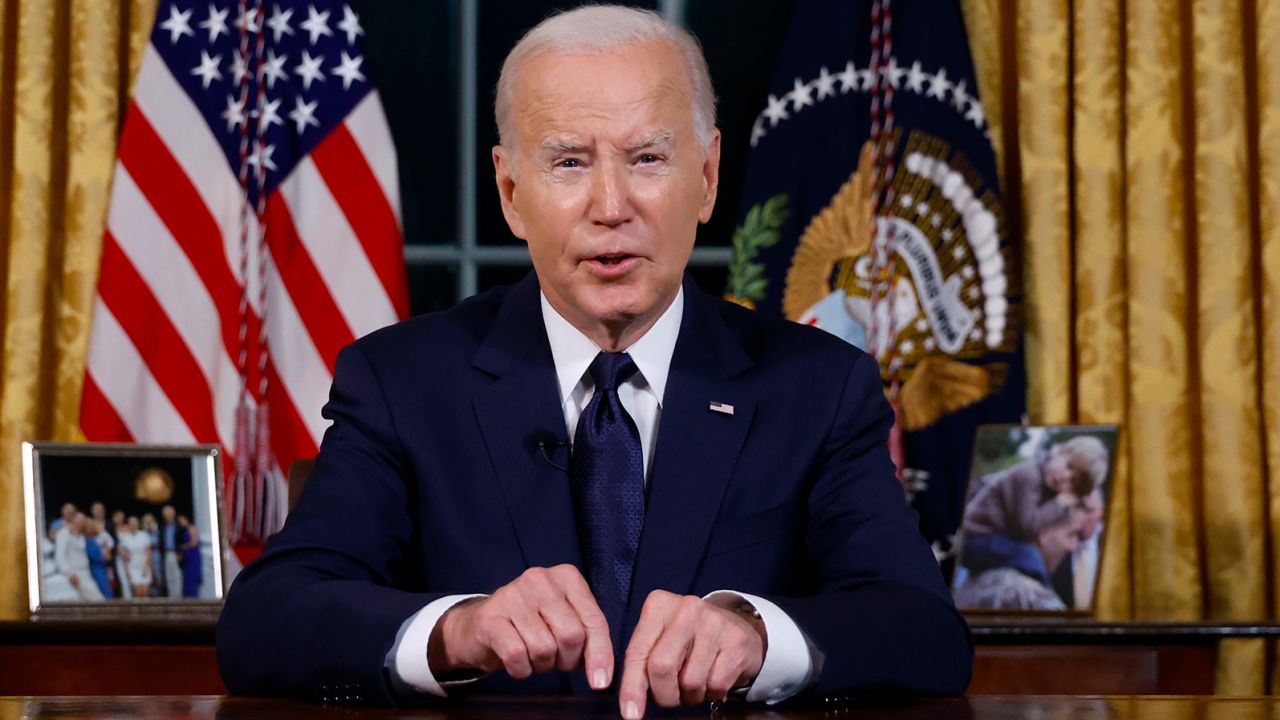Israel’s defence minister has told his troops they’ll soon see Gaza “from the inside”. The operation will likely be Israel’s largest since it invaded Lebanon in 2006 to rescue hostages and degrade the Iranian-backed Hezbollah there.
- That conflict lasted a little over a month and ended, per an Israeli government inquiry, “without a clear military victory”.
Meanwhile, UN officials said 20 trucks of humanitarian aid were waiting on the Egyptian side of the Rafah border crossing, ready to enter Gaza.
- The UN is mandated to inspect each truck to ensure only humanitarian aid passes through, but today’s planned delivery now looks delayed.
- Aid agencies are saying that while even limited aid to Gaza is welcome, it’s “a drop in the ocean of need”.
“We are the essential nation”
President Biden delivered an address from the White House last night, his third major speech since the 7 October Hamas attacks on Israel.
Stay on top of your world from inside your inbox.
Subscribe for free today and receive way much more insights.
Trusted by 114,000+ subscribers
No spam. No noise. Unsubscribe any time.
- His main goal was to link US military support for Israel (a broadly bipartisan position) with US military support for Ukraine (an increasingly polarising issue) in America’s public debate.
Biden also pushed back against isolationist critics, arguing:
- “History has taught us that when terrorists don’t pay a price for their terror, when dictators don’t pay a price for their aggression, they cause more chaos and death and more destruction. And the cost and the threats to America and the world keep rising.”
Biden will reportedlytoday ask Congress to approve military aid for Israel ($14B) and Ukraine ($60B). By fusing both requests into a single bill, he hopes to avoid Congress backing Israel without also sending aid to Ukraine.
Other notable global reactions:
- In his first public comments on the issue, China’s President Xi Jinping called for a ceasefire, while the foreign ministry criticised the US for vetoing Wednesday’s UN Security Council resolution on Gaza.
- UK Prime Minister Rishi Sunak touched down in Israel for a two day visit yesterday (Thursday), telling Netanyahu that Britain “will stand with your people and we also want you to win”.
- And regional governments aren’t addressing the US corroboration of Israel’s assessment that a Palestinian group caused Tuesday’s Gaza hospital blast, beyond Jordan saying “nobody is buying that narrative”.
What we’re monitoring this weekend
Regional protests that could turn inwards
- Egypt and Jordan have had broadly stable relations with Israel for decades, while Morocco and Bahrain were both party to the 2020 Abraham Accords which normalised their relations with Israel.
- All four have seen large, government-encouraged anti-Israel protests in recent days. Their security services will know there’s a risk this fury can turn back on their own ‘Israel-tolerating’ governments.
Iran-backed groups in Lebanon, Yemen, and beyond
- The fact Israel has waited two weeks (and counting) before invading Gaza has bought critical time to deter Hezbollah (to Israel’s north). But there’s speculation Hezbollah will attack once Israel enters Gaza.
- And all Five Eyes countries are now urging their citizens to leave Lebanon, a possible indicator (per the ‘Lockerbie rule’) that they have intel on Hezbollah’s operational planning.
- In parallel, a US destroyer in the Red Sea shot down three land-attack cruise missiles and eight drones launched by Iranian-backed Houthis in Yemen, potentially headed towards Israel.
Final thought: It feels like the US has now played all its cards to deter a wider war: hard deterrence in the form of two carrier groups off Israel, active diplomacy in the form of a presidential visit, and public signalling that it’s in this for the long haul.
It really now depends on how Israel conducts its ground operation in Gaza, and how the rest of the region reacts.









